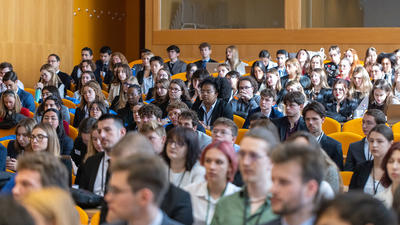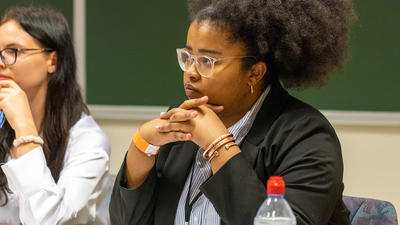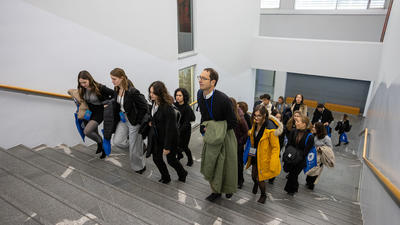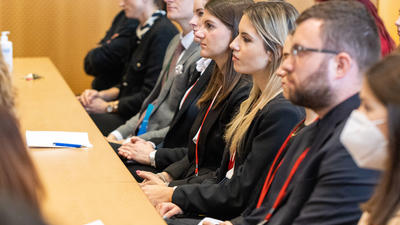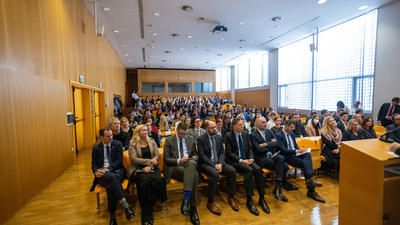-
Our work
-
Fields of work
- Arms control
- Border management
- Combating trafficking in human beings
- Conflict prevention and resolution
- Countering terrorism
- Cyber/ICT Security
- Democratization
- Economic activities
- Education
- Elections
- Environmental activities
- Gender equality
- Good governance
- Human rights
- Media freedom and development
- Migration
- National minority issues
- Policing
- Reform and co-operation in the security sector
- Roma and Sinti
- Rule of law
- Tolerance and non-discrimination
- Youth
- Field operations
- Projects
-
Meetings and conferences
- Summit meetings
- Review Conferences
- Ministerial Council meetings
- Plenary meetings of the Permanent Council
- Plenary Meetings of the Forum for Security Co-operation
- Security Review Conferences
- Annual Implementation Assessment Meetings
- Economic and Environmental Forum
- Economic and Environmental Dimension Implementation Meetings
- Human rights meetings
- Media conferences
- Cyber/ICT security conferences
- Conference of the Alliance against Trafficking in Persons
- Gender equality conferences
- Annual OSCE Mediterranean conferences
- Annual OSCE Asian conferences
- Partnerships
-
Fields of work
-
Countries
- All
-
Participating States
- Albania
- Andorra
- Armenia
- Austria
- Azerbaijan
- Belgium
- Belarus
- Bosnia and Herzegovina
- Bulgaria
- Canada
- Croatia
- Cyprus
- Czechia
- Denmark
- Estonia
- Finland
- France
- Georgia
- Germany
- Greece
- Holy See
- Hungary
- Iceland
- Ireland
- Italy
- Kazakhstan
- Kyrgyzstan
- Latvia
- Liechtenstein
- Lithuania
- Luxembourg
- Malta
- Moldova
- Monaco
- Mongolia
- Montenegro
- The Netherlands
- North Macedonia
- Norway
- Poland
- Portugal
- Romania
- Russian Federation
- San Marino
- Serbia
- Slovakia
- Slovenia
- Spain
- Sweden
- Switzerland – OSCE Chairpersonship 2026
- Tajikistan
- Türkiye
- Turkmenistan
- Ukraine
- United Kingdom
- United States of America
- Uzbekistan
- Asian Partners for Co-operation
- Mediterranean Partners for Co-operation
-
Structures and institutions
- Chairpersonship
-
Secretariat
- Secretary General
- Office of the Secretary General
- Conflict Prevention Centre
- Transnational Threats Department
- Office of the Special Representative and Co-ordinator for Combating Trafficking in Human Beings
- Office of the Co-ordinator of OSCE Economic and Environmental Activities
- Gender Issues Programme
- Opportunities for Youth
- Department of Human Resources
- Department of Management and Finance
- Office of Internal Oversight
- Documentation Centre in Prague
- Institutions
-
Field operations
- Presence in Albania
- Centre in Ashgabat
- Programme Office in Astana
- Programme Office in Bishkek
- Mission to Bosnia and Herzegovina
- Programme Office in Dushanbe
- Mission in Kosovo
- Mission to Moldova
- Mission to Montenegro
- Mission to Serbia
- Mission to Skopje
- Project Co-ordinator in Uzbekistan
- Closed field activities
- Parliamentary Assembly
- Court of Conciliation and Arbitration
- Organizational structure
- About us

Story
OSCE Court of Conciliation and Arbitration Moot Court explores space activities and artificial intelligence
- Date:
- Source:
- Court of Conciliation and Arbitration
- Fields of work:
- Education, Youth
The OSCE Court of Conciliation and Arbitration’s Moot Court was hosted for the third time by the Faculty of Law of the University of Ljubljana from 11 to 13 November. The Court simulated arbitral proceedings under the provisions of the Convention on Conciliation and Arbitration within the OSCE to give participating students the opportunity to get a closer insight on its provisions and a practical training.
The fictional arbitral tribunal was held within the framework of the 10th Model United Nations Club at the Faculty of Law of the University of Ljubljana conference (MUNLawS), organized by Professor Vasilka Sancin, head of the department of international law at the University of Ljubljana and a member of the Bureau of the CCA. The MUNLawS conference is set up as forum for exchange for young students and future decision-makers on matters regarding international organizations.
The conference was opened with a recorded address by Borut Pahor, President of the Republic of Slovenia, as well as welcome messages from Ambassador Juraj Chimel, Ambassador of the Czech Republic to Slovenia; on behalf of the Czech Presidency to the Council of EU, Dr. Marko Rakovec, Director General of the Department for International Law and Protection of Interests, Ministry of Foreign Affairs of the Republic of Slovenia; Christa Allot, Executive Officer, OSCE Court of Conciliation and Arbitration; and Gal Veber, Secretary General of MUNLawS 2022.
This year’s imaginary case involved two fictional States, the Republic of Antlia and the Kingdom of Ruchbah. The case dealt with a joint space agency’s premature launch of a satellite operating software based on artificial intelligence and with allegedly inaccurate information on orbital parameters of space objects and debris. This caused the collision of two satellites, resulting in a loss of revenue for both States involved. Students acted as agents for the claimant and respondent as well as judges at the arbitral tribunal.
This year’s MUNLAWS conference gathered more than 190 students from 26 countries who actively participated in the simulations of the different committees.
The Court of Conciliation and Arbitration within the OSCE based in Geneva provides a set of mechanisms for the peaceful settlement of disputes between States. The Court was established by the Convention of Stockholm, which entered into force on 5 December 1994. To date, 34 States have ratified the Convention.
OSCE Impact
Discover more stories about how the OSCE improves lives.

Story
A story of an extraordinary woman who successfully runs her business in Kadamjai, Batken province
24 January 2023
OSCE Programme Office in Bishkek

Story
Improving the quality and accessibility of education in the Issyk-Kul province of Kyrgyzstan
30 November 2022
OSCE Programme Office in Bishkek
